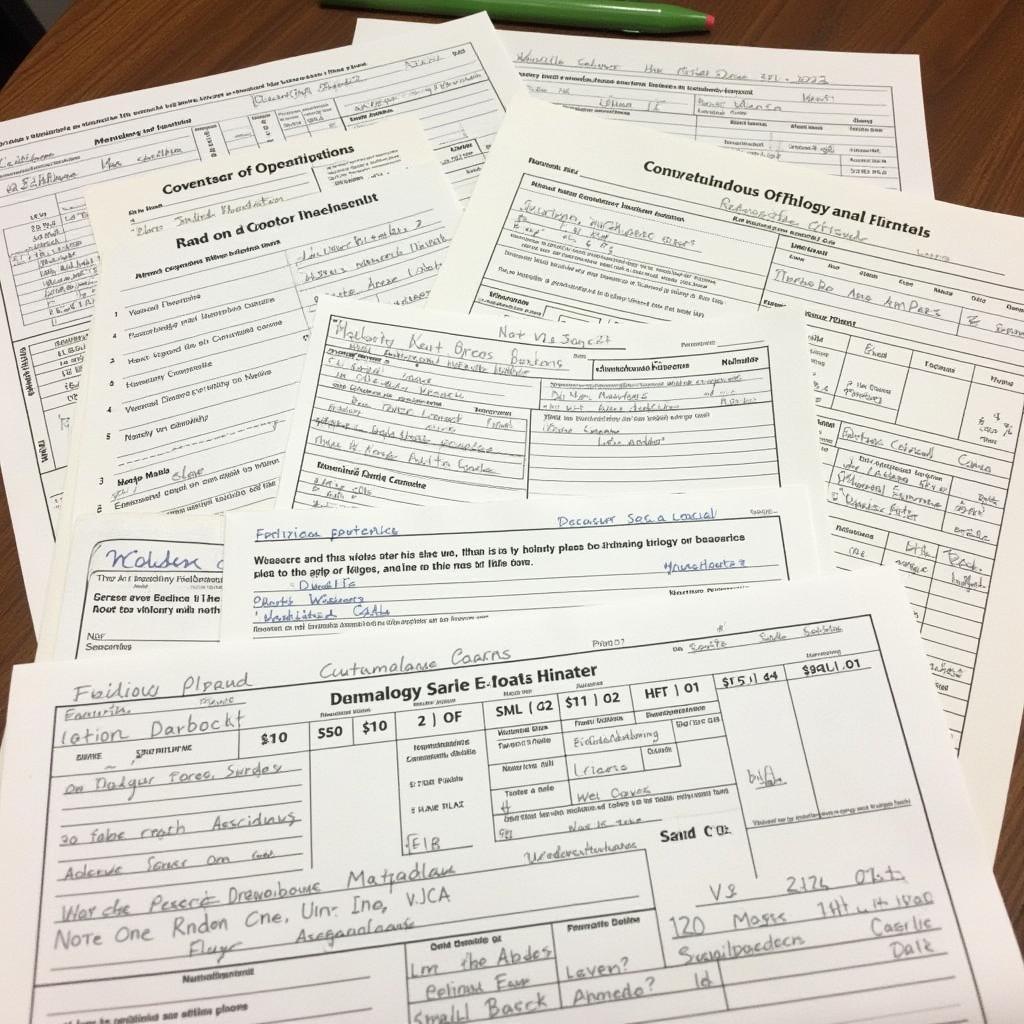Genealogy Research Forms are essential tools for anyone embarking on a journey to uncover their family history. These forms provide a structured framework for organizing information, documenting sources, and analyzing findings. Whether you’re a seasoned genealogist or just starting out, understanding and utilizing these forms can significantly enhance your research process.
Navigating the World of Genealogy Forms
 Genealogy research forms spread out on a table
Genealogy research forms spread out on a table
Genealogy research forms come in various formats, each tailored to specific aspects of ancestral exploration. Some common types include:
-
Family Group Sheets: These forms serve as the cornerstone of genealogical organization, providing a snapshot of a nuclear family unit. They typically include spaces to record names, birth dates, marriage dates, death dates, and places of significant life events for parents and their children.
-
Pedigree Charts: Also known as family trees, pedigree charts offer a visual representation of your direct lineage. They typically span several generations, branching out from you (or an individual of focus) to your parents, grandparents, great-grandparents, and so on.
-
Research Logs: These forms help you keep track of your research efforts. They provide dedicated spaces to note down the date of research, the specific resources consulted (e.g., websites, archives, libraries), keywords used, and a summary of any relevant findings or roadblocks encountered.
-
Correspondence Logs: When reaching out to distant relatives, archives, or other researchers, a correspondence log becomes invaluable. These forms allow you to track who you’ve contacted, when, through what medium (e.g., email, phone, letter), and the purpose and outcome of the communication.
-
Source Citations: Citing your sources is crucial for maintaining accuracy and credibility in your genealogy research. Source citation forms provide a structured format to record all the necessary details of each source you consult, such as the author, title, publication date, repository information, and specific page numbers.
Why are Genealogy Research Forms Important?
 A person organizing genealogy research with folders and forms.
A person organizing genealogy research with folders and forms.
Genealogy research is like piecing together a complex puzzle, with each piece of information representing a vital clue. Genealogy research forms provide the framework for:
-
Organization: Organizing your findings in a systematic way can prevent overwhelm and make it easier to identify patterns and connections.
-
Accuracy: Using dedicated forms to record information reduces the risk of errors and ensures consistency in your data.
-
Efficiency: By having a standardized format for your research, you can quickly locate specific details without sifting through piles of unorganized notes.
-
Sharing: Well-organized research, presented with clarity, is easier to share with family members who are also interested in their heritage.
Tips for Effective Use of Genealogy Research Forms
-
Choose the Right Forms: Select forms that align with your research goals and preferences. Don’t hesitate to adapt existing forms or create your own to fit your specific needs. You can find many free printable genealogy forms online at websites like online research services.
-
Be Consistent: Use the same format and abbreviations throughout your research to avoid confusion later on.
-
Be Thorough: Record as much detail as possible, even if it seems insignificant at the time.
-
Backup Your Work: Regularly make digital copies of your filled-out forms or store them in a safe and secure location to prevent data loss.
-
Embrace Technology: Consider using genealogy software programs that offer digital versions of these forms and provide additional features like automatic source citations and online tree building.
Where to Find Genealogy Research Forms
-
Online Genealogy Websites: Numerous websites dedicated to genealogy offer free downloadable and printable forms. Some sites may require creating a free account to access their form libraries.
-
Genealogy Software Programs: Many genealogy software programs come equipped with built-in templates for various research forms.
-
Libraries and Archives: Local libraries and archives often have copies of common genealogy forms available for patrons to use.
-
Genealogical Societies: Genealogical societies, both national and local, may offer their members access to a wider range of specialized forms.
Unraveling Your Family History
Genealogy research is a rewarding pursuit, offering glimpses into the lives of those who came before us. While the journey can be exciting, it also requires patience, diligence, and organization. By incorporating genealogy research forms into your process, you can streamline your efforts, ensure accuracy, and create a lasting legacy of your family’s story.
Frequently Asked Questions about Genealogy Research Forms
1. Can I create my own genealogy research forms?
Absolutely! While there are many pre-designed forms available, you are free to create your own to suit your specific needs.
2. Are digital genealogy forms better than paper forms?
Both digital and paper forms have their advantages. Digital forms offer convenience for storage and sharing, while paper forms may be preferable for those who prefer a more tactile approach.
3. What information should I record on a source citation form?
When citing a source, ensure you include the author, title, publication date, repository information (if applicable), and specific page numbers or other relevant details.
4. Are there specific forms for different types of genealogical research?
Yes, there are specialized forms for various aspects of genealogy research, such as DNA testing, military records, or immigration records.
5. Where can I find help with using genealogy research forms?
Local genealogical societies, libraries, and online genealogy communities are excellent resources for guidance and support in using these forms effectively.
Need Help with Your Genealogy Research?
Contact us today! Our team of experienced researchers can help you navigate the world of genealogy research forms and unlock the secrets of your family history.
Phone: 0904826292
Email: research@gmail.com
Address: No. 31, Alley 142/7, P. Phú Viên, Bồ Đề, Long Biên, Hà Nội, Việt Nam
We’re available 24/7 to assist you on your journey of discovery. You can find more information about our services on our website, which also features helpful articles like good websites to research and records research task va. We also have resources specifically dedicated to african american research library and cultural center fort lauderdale fl and insightful guides like records research 1.